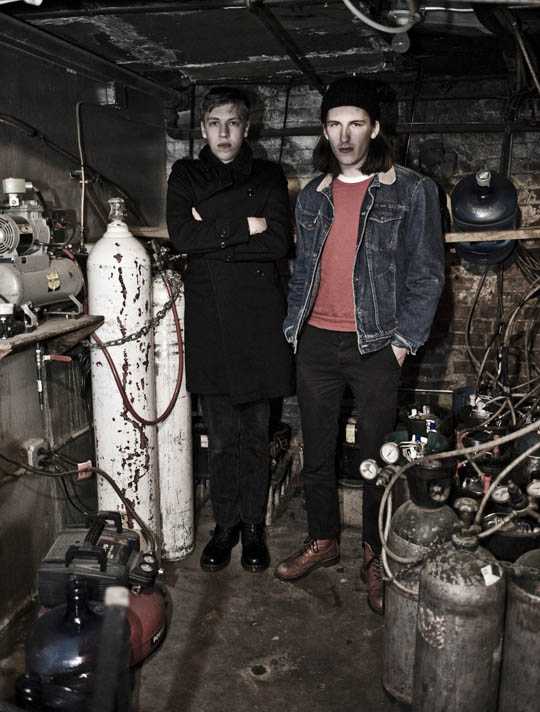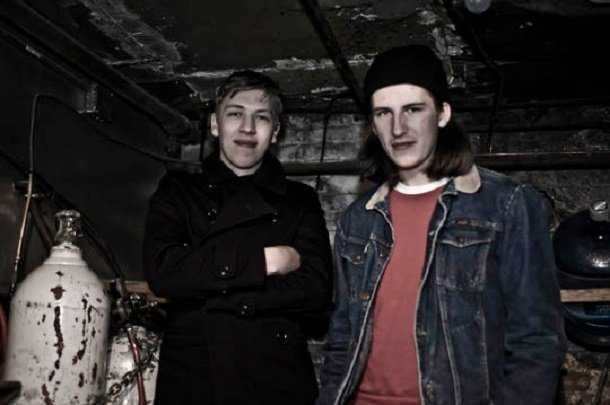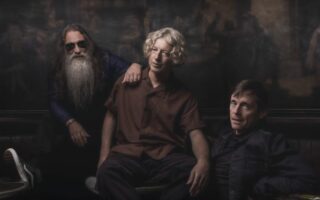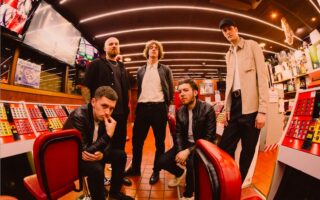
Drenge – Photo: Paul Bachmann / Live4ever Media
Drenge’s 2013 self-titled debut album marked them down as one of the most promising new British bands of recent times. Brothers Eoin (guitar/vocals) and Rory Loveless (drums) became part of an increasingly saturated ‘duo’ market, now dominated by Royal Blood, but stood out with a gritty brand of post-grunge rock n’ roll that has steadily gained them a loyal and passionate fanbase back home.
Follow-up ‘Undertow‘ should be a meatier affair though, if the irresistible first single ‘We Can Do What We Want’ is anything to go by. Using the help of bass player Rob Graham to both expand their horizons and rise above that crowded two-piece world, the track hits like a latter day Ramones if those punk pioneers had cut their teeth in urban Derbyshire rather than late-night seventies New York.
More of the same will play well in the States, and is likely to see that loyal fanbase expanding still further, and into new territory. Live4ever sat down with the Loveless brothers in New York City, just after a short tour which included their first televised appearance in the US on The Late Show With David Letterman, a barnstorming performance which even a microphone hitch couldn’t get in the way of.
We talked through the aftermath of Letterman, as well as the shift in recording techniques on the new album and its influences.
Where does the band’s identity come from?
Eoin: It is about being really honest, the aggression side of things. I think I was listening to a lot of music that my mates were listening to, and it was all just very mediocre. There wasn’t a sense of emotion in it. In a time of recession, it’s like where as the anger gone?
You recorded the first album live, what about the second?
Eoin: Not as much.
Rory: With the first album, Russ the producer just put us in the same room and it came out with tons of energy. I guess it’s because we didn’t know what we were doing as well. With the second album it is way more professionally executed, which isn’t to say that it’s been professionally executed. It is just slightly more well done.
Are you happier with the output?
Rory: Yeah, I’m really proud of it.
What about the bass player? Did he record on the album? Is he a mate?
Eoin: He played on two tracks. I played bass on the rest of the album. He is a touring member. He is a really good mate; we’ve known him since we were ten.
Do you want to use your music to voice your opinion? For political arguments?
Rory: Probably not so much. We haven’t really focused on protest songs in a way. It’s been a bit more inwards looking, especially the first album.
Eoin: I guess the first album is aggression, railing against what’s being handed down to you. The theme of this one is more fear. That sense of dread, like if everything continues the way it’s going, nothing good is going to happen, especially in the UK. It’s just a horrible place to live at the moment.
Why not be more out there with your opinion?
Eoin: Because whenever I think of writing something like that, it never comes across as being genuine. When I think about writing a song like that and when you sit down, and you’re there with a pen, and you’re like, “I’m angry”, the best way for me to get it out is to write about the personal. I hate living in a Tory-governed United Kingdom, but everyone does, and it’s almost pointless saying stuff like that. It’s on everyone’s mind – you don’t need a band to articulate that for you. Cass McCombs has this great song called ‘Don’t Vote,’ which is my favorite political protest song.
So you do appreciate a song like ‘Don’t Vote,’ which is stating something in particular, but it’s not your way of creating music. You way is?
Rory: It is indirect. It deals with the product of that kind of society, rather than who is heading up that society.
Eoin: I can’t complain about the welfare system because I haven’t had a proper job at an office for 20 years. I don’t feel like I am in a position where I can speak for all those people.

It sounds like you guys are influenced by the entire Seattle scene. Soundgarden, Alice In Chains, and obviously Nirvana. Would you say that’s accurate?
Rory: Not really no. We listened to Nirvana quite a bit before starting the band. We’ve moved on a bit since then to more Californian stuff, like Burger Records. With people like Ty Segal and Jay Reatard, they really helped inspire the start of this band. They’re not the definition of influence or whatever, but they were a starting point. I feel that we came out with something that is completely different to what we were listening to, which isn’t to say it’s original but it felt really British in comparison to all that stuff, at least the first album anyway. The second album is a bit more fleshed out. We listened to a bit of The Cure, stuff seeps through. We listen to all sorts of music so it is hard to tell where things are coming from.
How was going on Letterman? It was your first US TV performance.
Eoin: It was very quick. We walked in, soundchecked, went upstairs, then they started filming, we came down stairs and we played the song. When stuff like that happens your mind moves into a different zone, where stuff just seems really normal. Your shaking hands with the actor that’s appearing on the show, and he’s gonna be in the next Star Wars film, and then David Letterman comes out backstage and is going like, “Where’s the band? Are you the band?”, and you just go, “Yeah yeah,” and I don’t know. Our way of dealing with it is just keeping your head down and focus on playing the song.
Did you feel any of the ghosts in there, in the Ed Sullivan theater?
Rory: I don’t know, not really. It is a beautiful theater, the place inside looks great, but we walked in and soundchecked and there’s all the camera people, all the people behind the scenes that you don’t see. It feels a bit jobby in a way, but it’s amazing to see the whole band set up on the slide and the desk, but you’re viewing it from the other side. It lost a bit of the magic for me.
Eoin: You can’t really ignore The Beatles, and that sort of stuff is kind of strange. You are on an iconic set with all those bridges and things, but the people who work on that show just seep into the walls. They’re just part of what goes on. Everything was running on in jokes and stuff like that. That was the bit that was a bit alienating.
How was touring with the Deap Vally?
Eoin: They’re a lot of fun, and the time we spent with them was quite brief. We used to drive home every night on that tour. We didn’t stay at hotels or anything, but we’ve met up with them a bunch of times. They’re a lot of fun. They’re really good.
Pulled Apart by Horses? Are you fans of them?
Eoin: Yeah, they’re really good. We hung out with Tom’s dad and extended family at Leeds Festival last year. His dad is this really good guitarist and we had a proper laugh.
What about your comment about Royal Blood being poppy?
Eoin: It was actually a compliment, but it was taken out context. They just do something different from what we do. It was taken out of context, then taken out of context again and put in the NME.
Drenge release their second album ‘Undertow’ on April 6th. They tour the UK later that month, starting at the Nottingham Rescue Rooms



